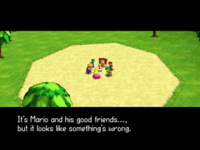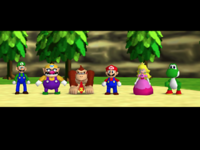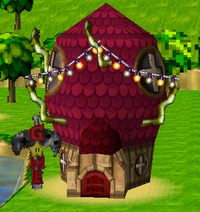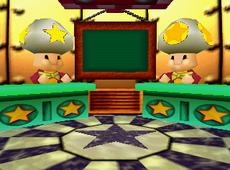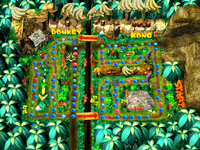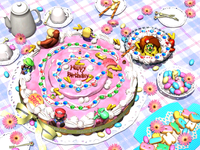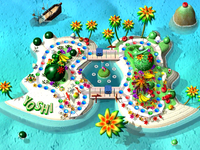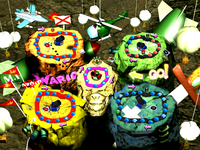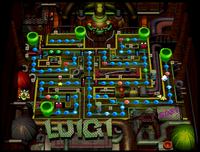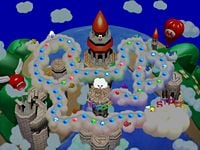Mario Party
Template:Articleabout Template:Infobox Mario Party (Japanese: マリオパーティ, Mario Pāti) is a video game based on a board game for the Nintendo 64, and the first of the expansive Mario Party series. Players choose one of six characters and move around the board. As they go around, they collect coins and various other items that can help them or hinder others in their quest to collect Stars.
What sets this game apart from others is the mini-games that follow each round. The players will be grouped together in groups of two, three against one, or everyone for themselves. They then compete in a game that tests their reflexes, puzzle solving skills, or plain luck. The winners will be awarded coins and the losers may lose coins.
Story
One day, Mario and his friends were sitting around arguing over who is the Super Star. Wario states that a Super Star must be strong, to which Donkey Kong agrees. Both get into an argument over who is stronger. Toad says that maybe Mario would make a good superstar, or Peach, or even the energetic Yoshi. The gang starts to close in on Toad, who shouts out that he has an idea of what they should do. He suggests that the crew take the Warp Pipe in Mushroom Village, and find out who is the Super Star of their adventures. He warns that the road will be dangerous and that being the super star requires not only strength, but courage, wisdom and kindness. Luigi bravely agrees first to this plan and steps off to find the warp pipe. Wario follows and the group agrees to the plan and also set off to find the warp pipe and become the next Super Star.
Game Modes
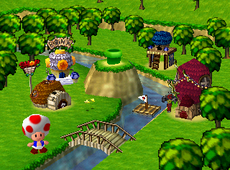
Game modes are selected from a "Map" screen, Mushroom Village, that the player is led to once starting the game. Each building or feature represents a mode, and the player can select one to play a certain mode.
Listed below are the available areas for the player to access in Mario Party:
Party Mode
Party Mode is the heart of Mario Party. Four players will play on a board game, each getting a turn to roll the dice, which will determine how many spaces they will move across, just like a traditional board game. After everyone rolls, a roulette will appear which will randomly select a minigame to play. This process will repeat itself until the set amount of turns is up.
Mini-Game House
The Mini-Game House is located to the right side of the river, and resembles a mushroom with a large, red cap.
Toad
The resident Toad of the Mini-Game house is an elderly-looking one named Puff who has a large red cap on its head, similarly shaped to the Mini-Game House itself. By speaking to him, the player is given a list of mini-games that have been played in the game so far. There are various price ranges of mini-games. Once one is bought, it can always be played for free via the orb on the table.
Pot o' Skills
The Pot o' Skills leads to the Mini-Game Stadium. The Mini-Game Stadium has its own board shaped in the form of a Star, and only has 24 total spaces. Each turn, players roll the dice and advance the number of spaces, like in Party Mode. However, blue spaces do not add coins and red spaces do not subtract coins. All coins are gained or lost from mini-games which are played at the end of each turn. There is one One-Player mini-game space as well. Passing Koopa will result in 10 coins for the player. At the end of the game, the player with the most coins wins.
Mushroom Shop
The Mushroom Shop is run by the Mushroom Shop Clerk and is located on the left side of the river on the map, it resembles a brown mushroom on its side. In the shop, various items can be bought with Coins earned from mini-games and Party games. Here is a listing of every item, along with its price and in-game description.
| Image | Name | Price | In-game Description | Notes |
|---|---|---|---|---|
| This appears randomly, and you get the number of Coins shown. | ||||
| This appears randomly, and you lose the number of Coins shown. | ||||
| This appears randomly, and only numbers 8 to 10 will appear on the block. | ||||
| This appears randomly, and only numbers 1 to 3 appear on the block. | ||||
| This appears randomly, and players change positions on the board. | ||||
| This appears randomly, and Boo, Koopa Troopa or Bowser will appear. | ||||
| This counts how many times you rotate the Control Stick. Use it in the Mini-Game House. | ||||
| This is the Record for the Juke Box in the Option House. | ||||
| This Parrot is good at mimicking characters' voices. It lives in the Option House. | ||||
| Get 10 percent interest on Coins you collect with this Lucky Box. | ||||
| Bet your Coins with this Box to get double or half of what you actually collected. | ||||
| This lets you see the End Credits and the names of people who made the game. | Complete the Eternal Star map to obtain this. | |||
| Koopa Troopa won't appear on the map, but it won't work on some maps. | Complete the Eternal Star map to obtain this. | |||
| Boo won't appear on the map, but it won't work on some maps. | Complete the Eternal Star map to obtain this. | |||
| This has many Gameballs with Mini-Games inside. What you get is a surprise. | This item appears after at least 25 minigames have been bought from the Mini-Game House and can be used until all minigames are bought. |
Mushroom Bank
The Mushroom Bank is where players can store their coins as well as Stars and items. The bank is run by two portly Toads who are similar in every way except that one has yellow stars on his head in place of the usual dots, while the other has orange stars within yellow circles.
The Left Toad
The Toad behind the left counter is in charge of storing the items the player buys at the Mushroom Shop until they are used during a game. Here is also where the player can choose how they want to save their coins, whether with the Coin Box, Lucky Box, or Casino Box.
The Right Toad
The Toad behind the right counter will tell the player how many total coins and stars the player has saved up. He will also say how many more stars need to be collected, out of 100, in order to unlock the Eternal Star map.
Option House
The Option House is a mushroom-resembling blue-topped toward the top of the map across the river. As the name suggests, it is used to adjust the multiple Options for the game. There are other features such as the Talking Parrot and Juke Box as well.
Toad
The resident Toad of the Option House can delete all saved data. Once spoken to and asked to delete all data, he takes out a remote and opens an electrical box on the other side of the house. The cover will open revealing a large red switch, and the player is asked if they are sure about deleting their data.
Talking Parrot
The Talking Parrot is an item that can be bought from the Mushroom Shop, and once bought, will appear on a perch in the Option House. By pressing the A button, the parrot speaks various voices from various characters in the game. These voices include:
- Boo
- Bowser
- Donkey Kong
- Koopa Troopa
- Luigi
- Mario
- Peach
- Toad
- Yoshi
- Wario
- The "narrator" voice that announces events in mini-games such as "Time Up!", "Game Over!", "Draw!", etc.
Sound Lever
The Sound Lever is a lever that changes the sound from Mono to Stereo or vice versa. There are two speakers at the bottom with pipes leading up the lever. By pulling the lever down, one of the speakers are deactivated and the sound is changed to Mono. There is no surround sound.
Juke Box
The Juke Box allows the player to listen to any song from the game. The only perquisite is that the player must have heard the song in the game itself before it becomes available on the Juke Box. The Juke Box becomes available for use after the player buys the Record from the Mushroom Shop for 50 Coins.
Mini-Game Island
Mini-Game Island is a special challenge in which the goal is to travel all around the island and beat every minigame one by one. After beating every minigame and reaching the end, Toad will challenge the player once more to a race against him and two other CPUs in Slot Car Derby. This mode is for one player only.
Playable Characters and their Colors
red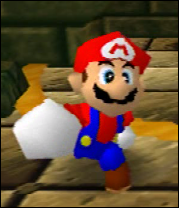
|
green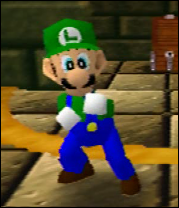
|
deeppink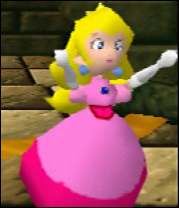
| |||
|---|---|---|---|---|---|
| Color | Red | Color | Dark Green | Color | Pink |
limegreen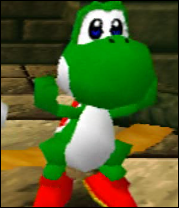
|
yellow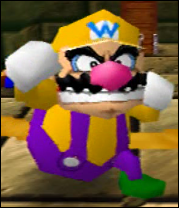
|
Brown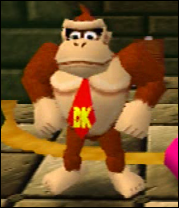
| |||
| Color | Green | Color | Yellow | Color | Brown |
Boards
Mario Party has eight game boards, more than any other game to date (not counting the Duel boards from Mario Party 3).
DK's Jungle Adventure
Map Difficulty: File:Star.PNG
DK's Jungle Adventure is Donkey Kong's board. Players aim to collect Stars in order to locate the mysterious treasure that is locked away in the jungle's ancient ruins. Four Whomps are guarding the junctions; to pass, a player must pay ten Coins. Landing on a Happening Space triggers a rolling boulder which in turn chases down any players standing in its way all the way to the path near the start of the board. If a player happens to meet Bowser on this board, they are "awarded" a useless Golden Bowser Statuette and are forced to pay him ten coins.
Peach's Birthday Cake
Map Difficulty: File:Star.PNGFile:Star.PNG
Peach's Birthday Cake is Peach's board. It is the smallest map of the ones available in Mario Party. Its main feature is the Flower Lottery, where a player plants a Red, Blue, Yellow, or Green seed (at the cost of ten coins) and grows a flower. Three flowers have a Toad face, while one flower has a Bowser face on it. After all four seeds are planted, four new ones can be chosen. This is run by a Goomba, who says if a player gets the Bowser face, he will "win" the lottery and go to Bowser, who will sell him the Bowser Cake, one of Bowser's Phony Items, for 20 coins. If one gets a Toad face one will "lose" the lottery and go in the direction of the Star. If a player lands on a Happening Space, they have the opportunity to plant a "Strawberry Seed" at the cost of 30 coins, which grows into a Piranha Plant. Once planted, if another player with stars lands on the Happening Space with the Piranha Plant there, it will steal a star from that player, and give it to the player that planted it.
Yoshi's Tropical Island
Map Difficulty: File:Star.PNGFile:Star.PNG
Yoshi's Tropical Island is Yoshi's board. Consisting of Watermelon Island, Cantalope Island, and a small island in the middle, it was said that many Yoshis live here, but only two are shown in the middle of the board. A Pink Yoshi is on the small island and is surrounded by whirlpools, with a Blue Yoshi who can't do anything about it. Players aim to collect stars to get rid of the whirlpools and reunite the two Yoshis. The Happening Spaces make Bubba the fish take Toad to the opposite island, Bowser taking his place. Bowser sells defective Bowser Tubes to players for 30 coins. Two Thwomps block both ways to the opposite island, and request fees from players if they wanted to pass. The fee always starts at one coin, but goes up by one coin each time until it reaches the limit of 50 coins to pass.
Wario's Battle Canyon
Map Difficulty: File:Star.PNGFile:Star.PNG
Wario's Battle Canyon is Wario's board. It is set on a canyon that has been split into four areas with Bowser's area in the middle. Players aim to collect stars to stop the feud between the Bob-omb Buddies and the Bob-ombs. To get around the board, players are placed into cannons and fired to another area; the area they are sent to is determined by a spinning wheel. If a player lands on a Happening Space, the Bob-ombs will switch directions of the cannons. Bowser's area can only be reached by asking the Fly Guy in the northeast area to carry the character conversing with him to Bowser for ten coins. Bowser also has a cannon in this area to replace his bogus item. However, instead of firing at a specific part of the board, Bowser will just fire a character at a random spot.
Luigi's Engine Room
Map Difficulty: File:Star.PNGFile:Star.PNGFile:Star.PNG
Luigi's Engine Room is Luigi's board.
Players need to collect stars to power up the engine in the middle of the room (but actually in the back of the playing board). The main feature is the board-wide system of red and blue doors. One set would rise up to block specific paths while the other set goes down to open other paths. The doors switch at the start of every turn, when players land on certain Happening Spaces, or if a robot on the board was paid 20 coins to switch them. ? spaces on steam generators near the engine make steam rise up out of the respective generator, propelling players to a higher section. Players that went to Bowser would see his "Make As Many Coins As You Want Mecha" in action. They would get a coin from Bowser, at the cost of 20 coins. No matter where the players go, all paths end in Warp Pipes that lead to Boo, who is near the start.
Mario's Rainbow Castle
Map Difficulty: File:Star.PNG
Mario's Rainbow Castle is Mario's board. It is placed on clouds with multiple towers, and is sky-themed. The main feature of this board is that the location of the Star does not change each time a player receives one. Instead, it is always located on the main tower of the map. Each time a player does receive a Star, however, the tower rotates, revealing Bowser. When the player reaches the tower while Bowser is there, he charges 40 coins for a Ztar. This does not add to the star count. The tower can also be rotated by any player landing on a Happening Space.
Bowser's Magma Mountain
Map Difficulty: File:Star.PNGFile:Star.PNGFile:Star.PNG
- Bought for 980 coins
Eternal Star
Map Difficulty: File:Star.PNGFile:Star.PNGFile:Star.PNG
Unlockable after 100 stars are gathered and all other boards are played once
Spaces
| Space | Description | |
|---|---|---|
| Blue Space | Players will gain 3 coins from landing on this. The amount of coins received will be doubled in the last 5 turns. This space is the most common space on all boards. | |
| Red Space | Anybody who lands on this space will lose 3 coins. On the last 5 turns, this amount will be doubled. | |
| Happening Space | A variety of events will happen if anyone happens to land on this space. These events can help or harm one or more players, and they differ from board to board. | |
| Chance Space | A player that lands here will play a Chance Time game. The player hits three blocks, which identify two players and what one will give to the other. Game-changing events can happen here, from trading stars or coins, to giving 1 Star or 10-30 coins to someone else. | |
| Minigame Space | A player that lands here will play a 1-Player Mini-Game. If the player wins the minigame, they will receive coins. If they lose, then the player loses 5 coins. If the game is a Bonus Mini-Game though, the player will be rewarded the amount of coins collected, but not lose any if they get none. | |
| Mushroom Space | A roulette block will appear if a player lands on this space. Either the player can receive a Mushroom, which will give the Player the chance to roll another dice block, or receive a Poison Mushroom, which will force them to forego their next turn's Dice Block roll. | |
| Bowser Space | Any player who lands on this space will trigger a roulette, which any of these events can follow:
|
There is also a Star Space. When a player passes here, they can obtain a Star only if they have at least 20 Coins. The Star Space won't count towards the player's movements, unlike other spaces.
Minigames
- Main article: List of minigames in Mario Party
Staff
- Main article: List of Mario Party staff
Gallery
Trivia
- Nintendo gave away a free Mario Party glove for a time after the game's release. The reason being was that many gamers got blisters and other ailments on the palms of their hands due to the mini-games that involved spinning the Control Stick around as fast as possible (This was the reason why Mario Party wasn't released on the Virtual Console). Nintendo suggested that the gamers should use the thumb to spin the Control Stick, but this method was a lot slower than rotating with the palm of the hand. Receiving the glove required proof of purchase of the first game of the series. The glove giveaway did not surface until after the release of Mario Party 2.
- Nintendo lost a Class Action Lawsuit that was filed by several families of the injured gamers and had to pay several thousands of dollars in damage reparations as a result.
- As a consequence of unbalanced difficulty and self-injury, there were no more minigames after Mario Party that involved spinning the control stick as fast as possible.
- A song entitled "Move to the Mambo!" was included with all JAP/PAL releases of the game, but never made it into the American version.
- There were no items in this Mario Party game.
- In the Japanese version of the game, When Wario or Luigi have to pay to Bowser or lose a minigame they exclaim "Oh, my God!" This was changed in other versions due to religious references.
- Wario's voice actor in the NTSC and PAL versions was a German trying to speak English which caused some minor controversy in Europe.Template:Refneeded
- This is the only game in the series where players lose 5 coins if they fail a Minigame. Players can also steal as many coins as they can from each other as well. These rules were removed for the rest of the sequels as being too harsh.
References
External Links
| Nintendo 64 games | ||
|---|---|---|
| Super Mario franchise | Super Mario 64 (1996) • Mario Kart 64 (1996) • Mario no Photopi (1998) • Mario Party (1998) • Mario Golf (1999) • Mario Artist: Paint Studio* (1999) • Mario Party 2 (1999) • Mario Artist: Talent Studio* (2000) • Mario Artist: Communication Kit* (2000) • Mario Tennis (2000) • Paper Mario (2000) • Mario Artist: Polygon Studio* (2000) • Mario Party 3 (2000) • Dr. Mario 64 (2001) | |
| Donkey Kong franchise | Diddy Kong Racing (1997) • Donkey Kong 64 (1999) | |
| Yoshi franchise | Yoshi's Story (1997) | |
| Crossovers | Super Smash Bros. (1999) | |
